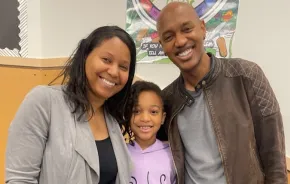
John O'Sullivan is trying to take us back — back to a time when 8-year-olds didn't get cut from an "A" team. To a time when kids played as many sports as they wanted rather than specialize in a single activity year-round. To a time when being young and playing sports was — wait, what's the word? — fun.
O'Sullivan is clear: He’s pro-sports. (He played professionally for the United Soccer Leagues’ Wilmington Hammerheads before becoming a coach for teams including at the University of Vermont and working as a director at youth soccer clubs in Vermont, Michigan, and Oregon.)
The message of his Changing the Game Project isn’t about being anti-competitive; there’s too much to learn from both the thrill of victory and the agony of defeat. Rather, he wants kids to excel at sports. And often the best way for them to do that is, as he explained at a Feb. 27 Mercer Island Parent Edge forum, for parents to get out of the way.
Keeping kids connected
Sullivan began his presentation with a slide featuring the findings of various studies: "We lose three-fourths of our kids from organized sports by age 13,” O'Sullivan says. "That's not a sports discussion; that's a wellness discussion."
We already know that kids need to move to be healthy; if they’re sedentary at ages 10, 11 or 12, it’s harder to break that habit later in life. Plus, plenty of brain research, including work at the University of Illinois, shows that physical activity enhances learning in young people.
Kids will stay more connected to their sport if they play and contribute to a team. This may mean parents need to set aside their egos and encourage kids to feel good about playing on a "B" team where they can practice their skills, get experience and learn far more than they would warming the bench of an "A" team.
In his work with sports coaches throughout the country, O'Sullivan advises those who work with younger kids to adopt the motto: “If you pick 'em, you play 'em.”
"Most kids would rather play on a losing team than ride the bench on a winning team,” he says. Be patient, develop the child's own love of the sport (or ideally, sports) and good things will happen.
Create a player-first environment
Free-play may seem like a foreign concept but it’s important as it allows our kids to exercise both our body and our minds. While we want our kids’ sports teams to be well-organized and solidly-coached, O'Sullivan says when it comes to game time, the intelligence needs to be on the field — not on the sidelines.
"It's the difference between kids' effort and tactics,” he says. “Yelling at Johnny to pick it up and work harder is one thing, but ‘Johnny, go steal the back post’ is another thing."
Give kids control and ownership. If they can set three goals for themselves, whether for the season, the year or longer-term,, accept those goals and then help your children achieve them. It's not about our goals for our kids, and it's certainly not about personal goals we might have never achieved.
Why specializing too soon stinks
Even if your kids love just one sport, O'Sullivan says that early specialization may be the surest way to end their sports careers early. Overuse injuries abound in kids who do one activity too much, whether that’s hitting a volleyball or running up and down a basketball court.
"At the top soccer academies in Europe, you know what they’re doing?” Sullivan says. “They’re doing gymnastics or martial arts to develop other strengths and skills [through that sports club].”
As O'Sullivan and I discussed after the forum, specialization too early also sorts kids into the wrong baskets based on the very wrong assumption that their physical size and skills as 9-year-olds are the same as what they’ll be as 15-year-old.
For children who are late-bloomers, they may effectively be cut from varsity even before middle school. O'Sullivan says he often meets with athletic directors who have 6- or 7-foot-tall boys walking their high school hallways, but who gave up basketball because they were cut in fourth grade.
"It's very easy to spot the talent that shouts, but the talent that whispers — the last kid to grow — those are the ones that we're missing."
What to look for in a coach or club
O'Sullivan advises parents in the audience to seek out teams where the coach develops a player’s character and skills. "If we wouldn't let a teacher say this or that to a child, then a coach shouldn't be allowed to say it either." If a coach's behavior is damaging not just as a player but as a human being, then sometimes we have to walk away.
In a special session with local coaches before the Feb. 27 parent forum, O'Sullivan asked them to write down the characteristics they most admired in their coaches growing up. They wrote words including “devoted," "good listener,” “encouraging" and “inspiring." The point: Most of us don't remember the wins and losses; we do remember how a coach made us feel.











